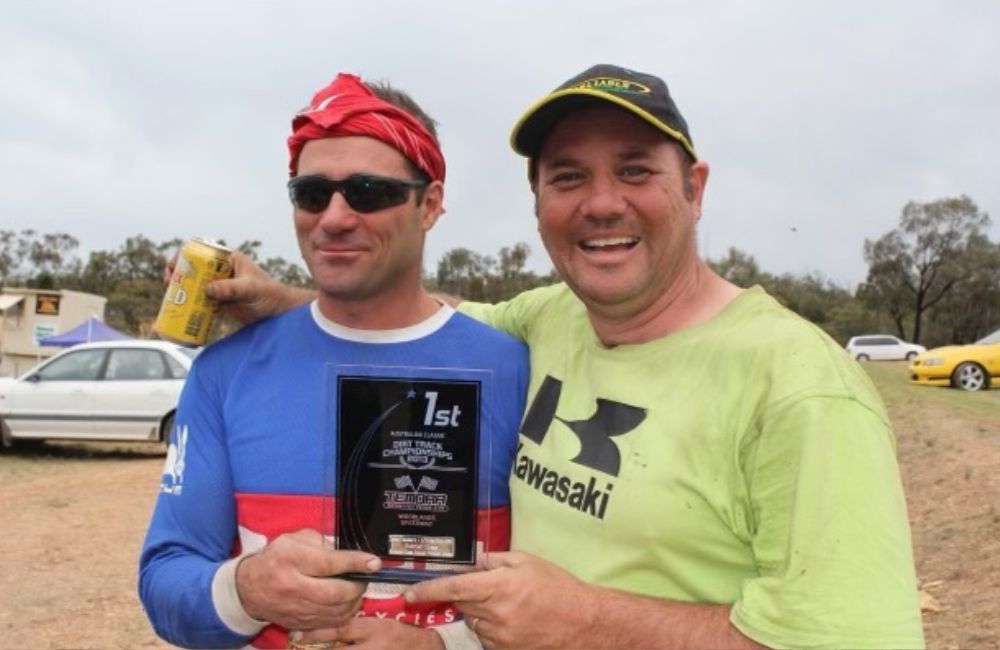The day his dad took his own life was like any other, says 18-year-old Charlie Edwards.
It came without warning and robbed him, his mum and his three siblings of a man that had served the NSW community for most of his adult life.
Charlie says it was an ordinary day which ended in a tragedy that no one saw coming.
His dad, Bradley Edwards, was 20 days shy of his 51st birthday.
He had been a policeman for 28 years.

In 2017 he retired from the force before packing up his young family and moving to Newcastle for what he’d hoped would be a fresh start.
But, Brad had suffered from Post Traumatic Stress Disorder (PTSD) for many years and sadly the same demons followed him to his new home.
On 5 June 2021 Bradley Edwards died from suicide.
“The last time I saw my dad was five days before it happened,” Charlie says.
“We were just hanging out and I was cleaning up his shed for him, sorting out random stuff.
“It was an average day.
“It happened when all of us least expected it, all of us, everyone, we did not expect this to happen.”
Charlie was 16 at the time.
The young man says he has since made a promise to bring awareness to a disease that has become an Australian epidemic.
“PTSD is a very real thing and it happens more than we perceive,” he told the Newcastle Weekly.
“It’s an invisible disease and it effects so many people in our world today.”

PTSD is the most common mental health condition in Australia after depression.
While not everyone who experiences trauma will develop PTSD, about 5-10% of Australians will suffer from PTSD at some point in their lives.
The numbers mean at any one time, more than one million Australians will have PTSD, with many not realising they have it, and only half of those affected seeking treatment.
“It’s an unbelievable number,” Charlie says.
“I mean one million is a huge amount of our population and that’s just here in Australia.”
It’s a disease he says the community must understand can affect anyone.
“The whole reason I started being an activist for PTSD awareness is because I realised how much police officers have to go through, but this is not just about police,” Charlie adds.
“Its war veterans, ambulance officers, fire department, ..and it’s the everyday person that works nine to five.
“Anything can happen to any person at any moment that can be traumatic.
“The brain is such a complex thing.
“Sometimes it just struggles to deal with things that have happened.
“It’ll put up a shield and go into fright-or-flight mode, but it has to process that eventually.”
Stationed in Dubbo, Mudgee and Wellington throughout his career, Brad had been seeking treatment for PTSD.
“I’ve learned that for a lot of people PTSD can come from a lot of experiences over a large amount of time, or it can be one single incident,” says Charlie.
“It comes from all different experiences and it’s different for each person and it can affect people of any age.”
Charlie has been campaigning to raise awareness about PTSD for the past three years.
In 2021, aged 16, he raised $11,500 for Pheonix Australia by walking 30km from Belmont Police Station to Newcastle Police Station and to Waratah Police Station.
“It was a crazy day weather-wise. It was stormy and it rained.
“At the end of the walk there was just four of us that finished.”
And, why Pheonix Australia?
“I chose Pheonix because they focus on active treatment and preventatives for people with PTSD,” Charlie told the Newcastle Weekly.
“They work on putting rules and measures and legislations into particular areas and they are actively researching.
“I felt like it was a small group making a big change, and that maybe I could help make a real difference.”

Tuesday 27 June is PTSD Awareness Day.
The day is about creating awareness of the disorder, looking at ways to support those who are affected by PTSD and learning more about the signs.
“We know that when people recognise the signs of PTSD, they are better equipped to take that first step towards better mental health,” says Pheonix Australia Centre for Post Traumatic Health director David Forbes.
For Charlie, the date is personal.
“I just want people to know about this invisible disease.
“I want to be able to help prevent tragedies like what happened to dad, and also to bring awareness to the daily suffering that people with PTSD have to go through.
“It affects so many people.
“Check in with mates, and family, make this day a reminder for you to look out for each other, be aware of PTSD. It can affect anyone.”
Pheonix Australia has been conducting research into the links between PTSD and military service, family violence, occupational trauma and stress, natural disasters and emergency services to name a few.
For more stories like this:
Get all the latest Newcastle news, sport, real estate, entertainment, lifestyle and more delivered straight to your inbox with the Newcastle Weekly Daily Newsletter. Sign up here.
